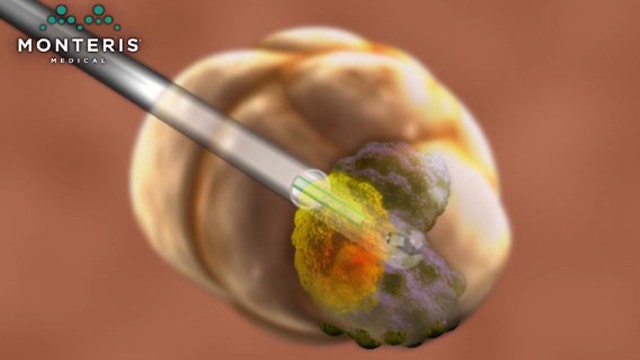Cutting-edge laser treatment zaps brain tumors
Doctors are using the Neuroblate laser to treat patients with recurring brain tumors
Meghan Schultz was 25 weeks pregnant when she started having seizures in the kitchen as she was preparing dinner in 2011.
"My left hand, my fingers, just started shaking and I had no idea what was going on. I was terrified," she said.
It got so bad that the 8th grade teacher passed out and was taken to a hospital in Columbus, Ohio. Scans showed she had a brain tumor.
"I thought this can't be happening to me. This doesn't happen to me. This happens to other people. These are stories you hear on the news, happening to other people," Schultz recalled.
Doctors at the Cleveland Clinic told Schultz she would have to wait until her son, Liam, was born to undergo surgery to remove the tumor. After the procedure, she underwent rounds of chemotherapy and radiation, but less than two years later, her brain tumor returned.
Schultz knew she would need another surgery, so in the fall of 2013, she opted for a new kind of laser treatment called Neuroblate.
"A laser which is a couple millimeters in size is directed into the tumor, and then the neurosurgeon controls the laser with a [magnetic resonance imaging] MRI,” said Dr. Manmeet Ahluwalia, a medical oncologist and associate director of clinical trials operations at the Cleveland Clinic. “We heat the tumors to kill the tumor cells."
The treatment is currently only used on patients who have already had surgery to remove a brain tumor. The procedure can take up to 10 hours depending on size of the tumor, but recovery times can be much shorter than with traditional surgery. Schultz went home after only two days.
"I was very tired for a few days, had very little pain, and I was back to work in five weeks,” she said. “It was definitely more emotionally taxing than it was physically taxing."
Today, Schultz is cancer-free and grateful to be able to enjoy time with her family.
Cancer centers around the U.S. are starting clinical trials to test Neuroblate as a first-line treatment on newly diagnosed patients.
For more information, visit ClevelandClinic.org.









































